How to make a gate for a chimney with your own hands: instructions for making a valve
The movement of air flows in the smoke exhaust channels is subject to the laws of physics, however, with the help of some devices, traction can be regulated. One of these devices is a slide gate - an indispensable attribute of a home or bath stove.
We will find out what types of valves there are and whether it is possible to build a gate for the chimney with your own hands, if there is no factory analogue at hand. The chimney element has a very simple design, but its manufacture requires at least minimal metal processing skills.
The content of the article:
What is a slide gate
The German word Schieber in Russian did not change either pronunciation or meaning. Speaking specifically about stove heating, a shutter type, which closes the chimney channel, is called a gate, as well as a gate valve.
At arrangement of the chimney duct the valve is installed in the upper part of the base, which is located in the room, so that, if necessary, it was possible to manually control the movement of gases, and at the same time the quality of the thrust.
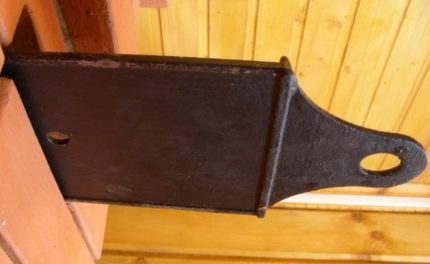
A chimney damper is required for traditional brick oven. By pushing it partially or completely, it is possible to reduce draft or block the movement of heated gases.
The damper is completely retracted when the stove is flooded and harmful gases stop entering the channel. Cases of death of people who have burned out of an early “closed” furnace are known.
If you are late in closing the shutter, the heat from the heated bricks will go into the pipe, and the room temperature will quickly drop. A shutter in time is a guarantee that the house will be warm for at least a day. As you know, in village houses in the cold season you have to flood the stove every morning.
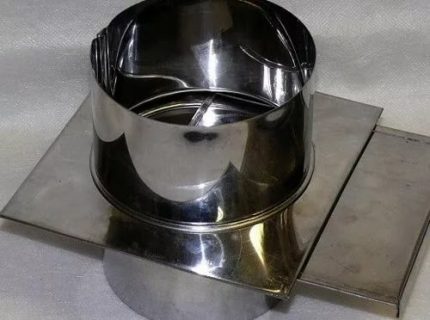
There is an opinion that the dampers required for brick furnaces are absolutely not necessary for the installation of steel furnaces (although they are offered by manufacturers), as well as for models with mounted deflector.
An argument against their use is the fact that the chimney with a closed valve is quickly clogged with soot. Its upper part is cooled from the cold air entering the pipe, which when in contact with a hot steel pipe forms a large amount of condensate. This situation requires more frequent chimney cleaning.
Differences between retractable and rotary gate
While it was a question of the sliding form of the slide gate on the stove chimney, although there is another type - rotary. Consider how they differ.
The purpose of both varieties is the same - to partially or completely block the flow of flue / heated gases. Differences relate to design.
A retractable model is a metal plate that is fixed in a frame and moves along the rails in a horizontal position. There are no strict requirements for the dimensions of the device, since they must correspond to the cross section of the chimney and are completely dependent on its parameters.
Thus, the valve consists of two main parts:
- frames, which is fixed in the chimney and is stationary;
- platesmoving inside the frame.
As a rule, both parts are made of the same material in order to maintain performance when heated or cooled.
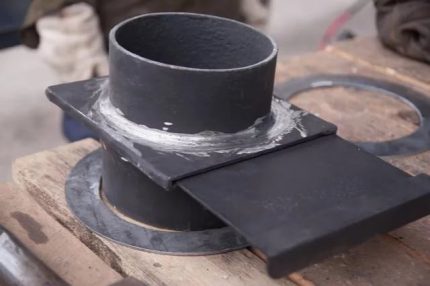
The design of the rotary (throttle) gate does not extend, but rotates along the axis, as the name implies.
A round or rectangular plate (depending on the cross section of the chimney) is fixed on a metal rod, the free end of which extends beyond the channel and is an adjustment tool.
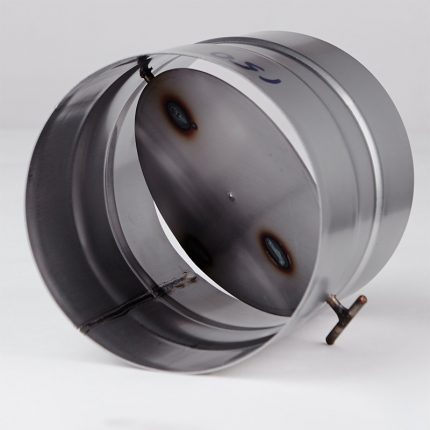
Gate valves are considered more reliable and wear-resistant devices. The weak point of the rotary devices is the connection of the rod and the plate, which over time loosens and renders the damper unusable.
Which material is stronger
In addition to structural differences, the types of gates can differ in the material of manufacture. The only possible option is metal, since only it does not burn and does not deform at high temperatures, and does not change its characteristics over time even in an aggressive environment.
For production use either cast iron or stainless steel. It is not possible to independently construct a cast iron shutter, since this requires at least a forge. However, on sale you can find both plain and beautifully designed cast-iron dampers.
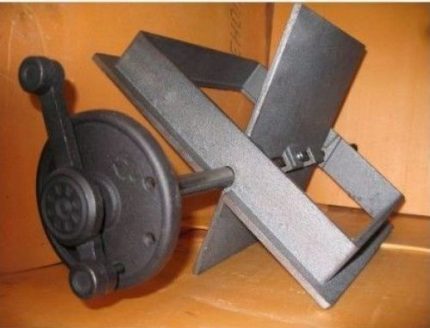
Steel products look simpler, but their characteristics are similar to cast iron counterparts. The advantage of steel fixtures in light weight.
If the cast-iron slide gate for the furnace chimney is installed only on a solid, solid structure, the steel valve is suitable for any chimney ducts - brick and steel, rectangular and round, solid and light.
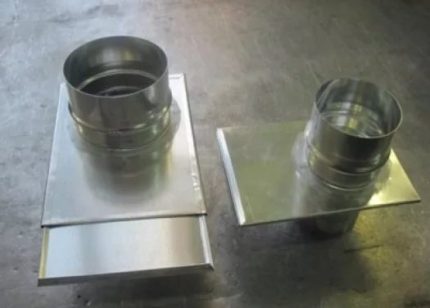
When choosing a material, you need to focus on chimney pipe characteristics and interior features.
For heating country stove a modest steel valve is enough, while a custom-made cast-iron gate is better for ennoblement of the Russian stove in the cottage.
How to make a slide gate valve with your own hands
Consider how to make both versions of the valves for chimneys - retractable and rotary. Each of them has its own nuances of manufacturing and installation. Let's start with a retractable view.
Preparation of materials and tools
To create the simplest model of retractable gate, galvanized steel is suitable. It is lightweight, due to its smooth surface it is easily cleaned of soot, and if necessary, the moving part can be easily replaced.
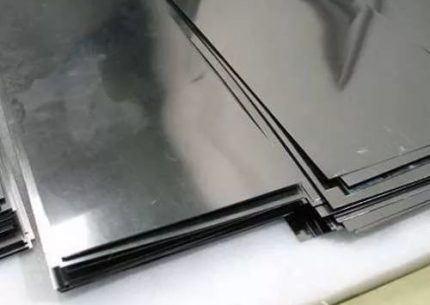
The main tools are a welding machine, electrodes, a grinder, scissors for metal (we choose depending on the thickness of the sheet), a drill with a grinding disc, drill bits for metal, a file.
Work is best done on a work bench with a vise. Among other things, you will need a sheet of paper for the template, tape measure, marker.
Drawing up the scheme (drawing)
Dimensioning should be taken seriously, since even a few millimeters can cause the chimney to malfunction. To find out the dimensions of the frame, measure the cross section of the chimney duct with a tape measure - it will coincide with the dimensions of the inside of the frame.
20-30 mm from three sides should be added to this value and the outside of the frame should be calculated.
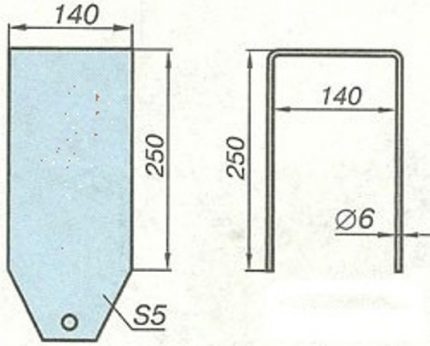
For the valve to extend easily, without effort, it should be slightly narrower than the width of the frame (if you take into account the external sides). To simplify the calculations, it is necessary to draw a design diagram and designate all possible sizes, so that in the future, while working with metal, you can navigate along them.
For metal pipes, the design of a flat damper is usually combined with a chimney fragment located perpendicularly.
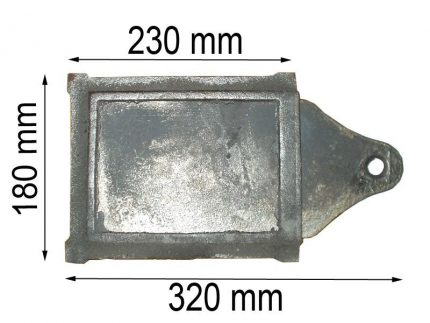
For brick chimneys, a sufficiently flat frame of wire or profile with a moving valve on the guides on two parallel sides is sufficient.
Marking and cutting parts
Having determined the exact dimensions, we cut out the frame for the gate. If the chimney is small, for example, in a bathhouse or in a summer kitchen, you can use a thick wire by bending it in the form of the letter P.
A more detailed frame is a robust corner profile. To make it, we cut a strip from sheet steel and bend it lengthwise at an angle of 90º. To give the profile the desired shape, in places where the angles are outlined, we cut one of the planes. When bent, we get a frame. We weld the bend places.
Next, cut out the damper itself. It should be about 5-10 mm narrower than the width of the frame. We adjust the length so that in the closed state only a small fragment of the valve looks out. It can be decorated in different ways: in the form of an eye with a hole or just a bent edge.
We clean the edges of the cut-out gate so that the closing / opening process takes place easily and silently. It is impossible to paint details.
Valve installation steps
The photo shows the steps of installing a factory-made gate. By the same principle, a home-made device is mounted.
The installation height of the damper largely depends on the design of the furnace, it is lower in bath furnaces, and higher in heating for homes. The minimum height is 0.9-1 m from the floor, the maximum is about 2 m.
Rotary Gate Instructions
Consider the option of manufacturing a slide gate valve for a metal pipe. Such a modification can be mounted both in a new chimney and in a ready-made and functioning stove.
It is a round plane with a welded metal rod - a kind of rotary mechanism and holder in one person.
Production material - a sheet of stainless steel 2-2.5 mm thick; metal rod 6-7 mm (hollow tube); a pair of 8 mm bolts, a piece of metal fittings or a nail.
To cut and weld parts, you will need:
- a grinder with a set of discs - abrasive and detachable;
- marking tool - marker, construction tape, compasses;
- welding tool - welding machine, electrodes for steel, core;
- vise, pliers, wire cutters, hammer.
Also, during welding, protective clothing is required - gloves, glasses, overalls made of thick dense fabric.
Progress:
It remains to make a latch for the handle of steel sheet. The finished gate needs to be cleaned of soot from time to time, and it is also necessary to control the strength of the welding spots.
Conclusions and useful video on the topic
With the help of videos you will expand your horizons, learn more about furnace valves and how to install them in the chimney.
How to make a shutter in 5 hours:
Scheme of mounting the gate on a brick furnace:
Option for installing a choke for the fireplace:
It is advisable to engage in self-production of a gate if you have metal working skills, are able to use welding, a grinder and a drill - then the production process will benefit and positive emotions.
If knowledge and skills are not enough, it is better to purchase a ready-made valve, having previously taken the dimensions from the chimney.
There is something to supplement or questions arose on the topic - you can leave comments on the publication. The contact form is located in the lower block. If you yourself made a gate for the chimney and want to share ideas with readers - please add a photo of the product.

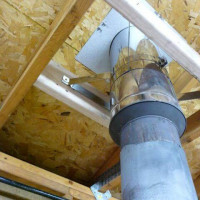 How to make the right chimney for a do-it-yourself stove: a step-by-step instruction
How to make the right chimney for a do-it-yourself stove: a step-by-step instruction 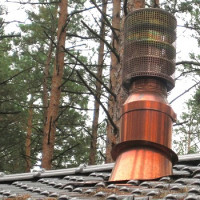 How to make a spark arrestor on a chimney with your own hands: a step-by-step guide
How to make a spark arrestor on a chimney with your own hands: a step-by-step guide 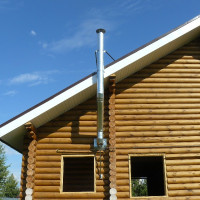 How to make a chimney in a private house with your own hands: design options and their implementation
How to make a chimney in a private house with your own hands: design options and their implementation 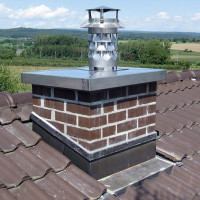 How to put a deflector on a chimney with your own hands: step-by-step instruction
How to put a deflector on a chimney with your own hands: step-by-step instruction 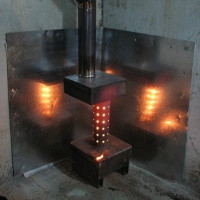 Do-it-yourself garage oven: a step-by-step guide to design
Do-it-yourself garage oven: a step-by-step guide to design 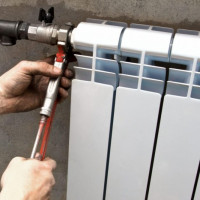 Do-it-yourself economical garage heating: how to reduce heat loss and the better it is heated
Do-it-yourself economical garage heating: how to reduce heat loss and the better it is heated 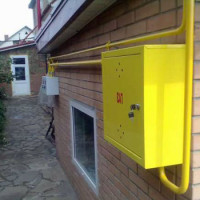 How much does it cost to connect gas to a private house: the price of organizing gas supply
How much does it cost to connect gas to a private house: the price of organizing gas supply  The best washing machines with dryer: model rating and customer tips
The best washing machines with dryer: model rating and customer tips  What is the color temperature of light and the nuances of choosing the temperature of the lamps to suit your needs
What is the color temperature of light and the nuances of choosing the temperature of the lamps to suit your needs 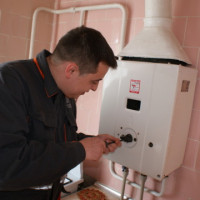 Replacement of a geyser in an apartment: replacement paperwork + basic norms and requirements
Replacement of a geyser in an apartment: replacement paperwork + basic norms and requirements
My aunt, I remember, had such a gate in the house in Soviet times: a gas stove with nozzles, a brick, and under the ceiling this gate. And so she used it quite peculiarly: when she turned on the stove, she always opened the gate (and always responsibly - she thought if the stove did not open, she would explode). And I closed it when I turned it off so as not to “dampen the stove”. I never even tried to regulate the thrust with these very gate valves. The thrust was regulated by a faucet on the gas nozzle.
Only fireproof brick is needed in the furnace, the kiln brick will collapse!
Hello. Nothing will be destroyed there. Refractory brick generally appeared only in 1822 (if I am not mistaken with the accuracy of the date). And in England. Many of us in the villages did not even know about him before the zero. Heel bricks still can be found in old buildings, and they are functioning.
We got a bath from the previous owner of the site. Everything is well done inside, but the furnace with a pipe is made in a simplified version, and there is no damper on the pipe. I understand that without it it is impossible to regulate the combustion process in the furnace and to keep heat in the steam room. But how to integrate this device into a finished metal pipe, in which the wall thickness is rather big?
In fact, there are several options for making an adjustable damper in a metal pipe of any thickness.
Option number 1 - weld a special adapter. I enclose the photo, it immediately becomes clear, it’s easier than painting what and why. If such a solution does not fit, then another can be considered.
Option number 2 - to make a slide gate. I’m also attaching a photo, here the work goes much less, the regulating mechanism is different. To implement this option, it is not necessary to dismantle the pipe and then put it back in place, cook. You can cut the damper into the pipe immediately.
Everything is fine, but without welding there was not a single piece of advice for the sauna stove - it seems that we have welding machines more often than microwave ovens and all welding masters ... In short - for those who don’t have welding and the stove is not a brick article that is absolutely useless ...
Hello. It is unclear, and here "not a brick oven." A welder can be invited to this type of work, but in general, you can just rent a machine and weld yourself, there is nothing complicated about it.
The article is not only about the gate, which is suitable for metal chimneys, but also for brick chimneys there are also examples. Naturally, the gate for stoves with a stone chimney is mounted at the construction stage, otherwise it would be impractical to do it! It is clear that not every person has a welding machine, but this equipment can always be borrowed from acquaintances or invite someone from friends to help. If there are none, then hire a specialist, I do not see any problems in this.
Well, no one bothers you to buy a ready-made gate valve, if you do not want to do it yourself.As the author of the article noted, “It is advisable to engage in self-production of a gate, if you have the skills to work with metal, you know how to use welding, a grinder and a drill, then the production process will benefit and positive emotions.” In another case, it is advisable to purchase a READY product. If you do not have the necessary tools, this does not mean that the article is bad and it gives impractical advice.